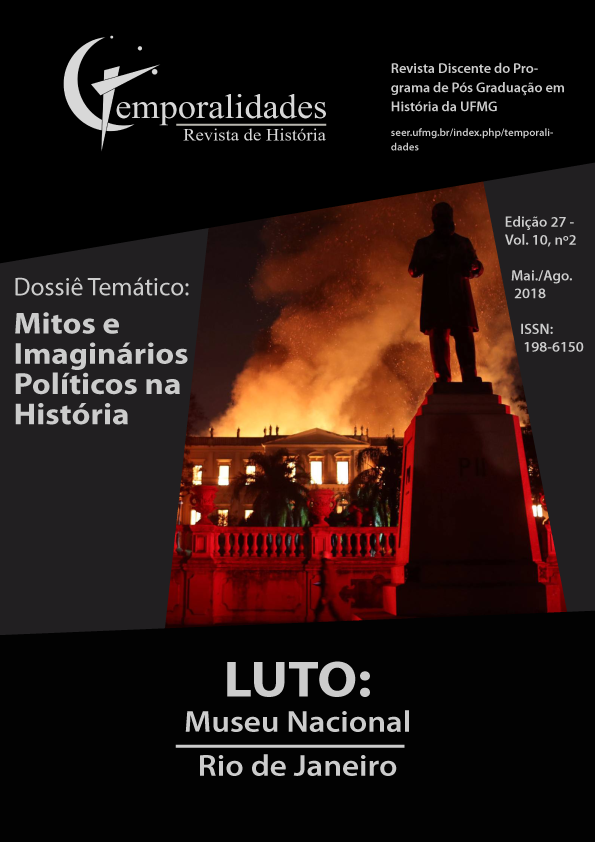A Estela Poética de Tutmés III: divinização do faraó ou interdependência?
Palabras clave:
Reino Novo, Divinização, InterdependênciaResumen
O presente artigo tem por interesse analisar um duplo aspecto presente em uma das fontes textuais egípcias, nomeadamente a Estela Poética de Tutmés III, construída durante a fase inicial do Reino Novo (1550-1069 a.C.). Ao mesmo tempo em que ela pode ser fonte da sustentação da divinização do faraó, serve também para que os templos e seus sacerdotes conquistem um espaço de discurso e demonstrem seu poder. Através dessa abordagem, cuja ênfase está principalmente em uma Análise Crítica do Discurso, acreditamos ser possível debruçarmo-nos na questão da interdependência entre as diversas instituições e grupos que formam o Estado egípcio e, assim, desmistificar a figura do faraó enquanto monarca divino cujo poder é absoluto. Figura essa que tem servido como um dos exemplos para justificativa de governos centralizados, inclusive na contemporaneidade.
Descargas
Citas
GALÁN, José M., “El visir Rekhmira”, In. El Imperio egipcio. Inscripciones, ca. 1550-1300, Barcelona: Trotta, 2002, p. 142-146.
HAWASS, Zahi & AL-SADDIK, Wafaa, “The Poetical Stele of Tuthmosis III”, In. Egyptian Museum Newsletter, issue 7, jan-abr, 2010, p. 8-9.
REDFORD, Donald B., “The Seventh Pylon Reveals”, In. The Wars in Syria Palestine of Thutmose III, Leiden: Brill, 2003, p. 119-127.
SIMPSON, William Kelly, “The Poetical Stela of Thutmose III”, In. The Literature of Ancient Egypt, New Haven: Yale University Press, 2003, p. 351-355.
Referências bibliográficas
ALLEN, James, P., Middle Egyptian: An Introduction to the Language and Culture of Hieroglyphs, Cambridge: Cambridge University Press, 2014.
ASSMAN, Jan, The mind of Egypt: history and meaning in the time of the Pharaohs, Nova York: Metropolitan Books, 2002.
BACZKO, Bronislaw, “A imaginação social”, In. LEACH, Edmund et Alii. Anthropos-Homem, Lisboa: Imprensa Nacional/Casa da Moeda, 1985, p. 296-332.
BUZBY, Russell, “Imperialism in Early New Kingdom Egypt”, In. Kaleidoscope eyes: Sidney, Outubro, 2002, p. 1-18.
CRUZ-URIBE, Eugene, “A Model for the Political Structure of Ancient Egypt”, In. Studies in Ancient Oriental Civilization, n. 55, The Oriental Institute of the University of Chicago: Chicago, 1994, p. 45-53.
FLAMMINI, Roxana Disputed “Rulership in Upper Egypt - Reconsidering the Second Stela of Kamose (K2)”, In. JSSEA, vol. 38, 2011-12, p. 55-75.
FRIZZO, Fábio “De Kamés a Amenhotep I. A Fundação das bases do Império egípcio do Bronze tardio (1541-1493 a.C.)”, In. R. Mest. História: Vassouras, v. 12 n. 1, jan./jun., 2010, p. 25-40.
FRIZZO, Fábio, Estado, Império e Exploração no Egito do Reino Novo, tese de doutorado, Niterói: UFF, 2016.
GNIRS, Andrea M., “Coping with the army: the military and the state in the New Kingdom”, In. MORENO GARCÍA, Juan Carlos (org.), Ancient Egyptian Administration, Leiden: Brill, 2013, p. 639-707.
HARING, Ben, “The Rising Power of the House of Amun in the New Kingdom”, In. MORENO GARCÍA, Juan Carlos (org.), Ancient Egyptian Administration, Leiden: Brill, 2013, p. 607-637.
KATARY, Sally L. D., “The Administration of Institutional Agriculture in the New Kingdom”, In. Ancient Egyptian Administration, Leiden: Brill, 2013, p. 719-783.
KÓTHAY, Katalin Anna, “Categorization, Classification, and Social Reality: Administrative control and interaction with the population”, In. Ancient Egyptian Administration, Leiden: Brill, 2013, p. 479-520.
LANGER, Christian, “The Informal Colonialism of Egyptology - From the French Expedition to the Security State “, In. WOONS, Marc & WEIER, Sebastian, Critical Epistemologies of Global Politics, Bristol: E-International Relations Publishing, 2017, p. 182-202.
MONTESQUIEU, Do Espírito das Leis, trad. Edson Bini, Bauru: EDIPRO, 2004.
MORENO GARCÍA, Juan Carlos, “From Dracula to Rostovtzeff or the misadventures of economic history in early Egyptology", In. FITZENREITER, Martin (ed.), Das Ereignis—Geschichtsschreibung zwischen Vorfall und Befund (IBAES, 10), London, 2009, p. 175-198.
MORENO GARCÍA, Juan Carlos, “Land Donations”, In. FROOD, Elizabeth, WENDRICH, Willeke (eds.), Encyclopedia of Egyptology, UCLA: Los Angeles, 2013a, p. 1-11.
MORENO GARCÍA, Juan, “The Cursed Discipline? The Peculiarities of Egyptology at the Turn of the Twenty-First Century”, In. CARRUTHERS, W. (org.), Histories of Egyptology: Interdisciplinary Measures, London, 2014, p. 50-63.
MORENO GARCÍA, Juan Carlos, “Limits of pharaonic administration - patronage, informal authorities, 'invisible' elites and mobile populations”, in. BÁRTA, Miroslav & KÜLLMER, Hella (orgs), Diachronic Trends in Ancient Egyptian History. Studies to the memory of Eva Pardey, Charles University in Prague: Prague, 2013b, p. 88-101.
MORRIS, Ellen, “The Pharaoh and Pharaonic Office”, In. LLOYD, Alan B., A Companion to Ancient Egypt, vol. 1, Oxford: Willey-Blackwell, 2010, p. 201-217.
O’CONNOR, David, “Thutmose III: An Enigmatic Pharaoh”, In. CLINE, Eric H.; O’CONNOR, David (Orgs.). Thutmose III: A New Biography. Ann Arbor: The Michigan University Press, 2006, p. 1-38.
REDFORD, Donald B., Egypt, Canaan and Israel in Ancient Times, Princeton: Princeton University Press, 1992.
SILVERMAN, David, “The nature of Egyptian kingship”, In. O’CONNOR, David & SILVERMAN, David, Ancient Egyptian Kingship, Leiden; Nova York; Köln: Brill, 1995, p. 49-92.
SIMIAND, François, Método histórico e ciência social, Bauru: Edusc, 2003.
SPALINGER, Anthony, War in Ancient Egypt: The New Kingdom, Oxford: Blackwell Publishing, 2005.
TILLEY, Christopher, Metaphor and Material Culture, Oxford: Blackwell Publishers Inc., 1999.
VAN DIJK, Teun A., Discurso e poder, 2 ed., 2ª reimpressão, São Paulo: Contexto, 2015.
WARBURTON, David, Egypt and the Near East: Politics in the Bronze Age, Rechercheset Publications, Neuchâtel – Paris, 2001.
Descargas
Archivos adicionales
Publicado
Número
Sección
Licencia
O(A) autor(a), para fins de submissão à revista Temporalidades, deve declarar que o trabalho aqui submetido é de autoria do mesmo e nunca foi publicado em qualquer meio, seja ele impresso ou digital.
O(A) autor(a) também declara estar ciente das seguintes questões:
Os direitos autorais para artigos publicados na Temporalidades são do autor, com direitos de primeira publicação para o periódico;
Em virtude de aparecerem nesta revista de acesso público, os artigos são de uso gratuito;
A revista permitirá o uso dos trabalhos publicados para fins não-comerciais, incluindo direito de enviar o trabalho para bases de dados de acesso público.
A Temporalidades adota a licença internacional Creative Commons 4.0 (CC BY).







